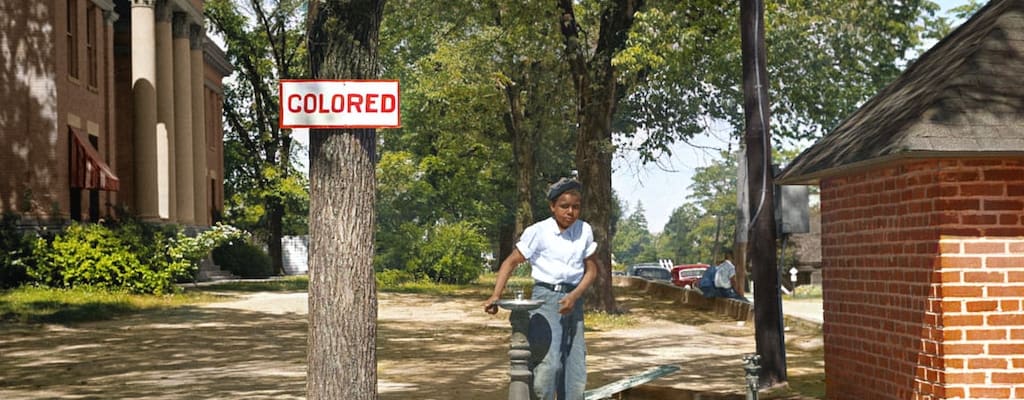on the wrong side of history: Idiom Meaning and Origin
What does ‘on the wrong side of history’ mean?
The idiom "on the wrong side of history" means being on the losing or morally incorrect side of societal progress. It implies that one's actions or beliefs will be judged negatively in the future.

Idiom Explorer
The idiom "wrong side of the tracks" refers to a disadvantaged or dangerous area, typically associated with lower socioeconomic status and higher crime rates.
The idiom "see the dark side of the moon" refers to experiencing or witnessing the hidden or negative aspects of a person, situation, or thing.
An idiom often used to describe a person who is disliked or considered bad, with negative qualities or behavior.
The idiom "pave the road to hell" means that even though someone may have good intentions, their actions or decisions can ultimately lead to negative consequences or harm.
The idiom "out of place" means something or someone not in the correct or suitable position, situation, or context.
The idiom "on the skids" refers to a situation or person that is in decline or deteriorating. It can describe something or someone facing a loss of reputation, success, or stability.
The idiom "on the side of the angels" means supporting or acting in a morally right or just manner, often in the context of a conflict or debate.
The idiom "on the receiving end" means being the person who is directly affected or subjected to someone else's actions or behavior. It implies being on the receiving side of something, typically negative or unpleasant.
Fighting Against the Current
The idiom "on the wrong side of history" is often used to criticize individuals, groups, or ideologies for opposing societal advancements or more enlightened perspectives. When someone is on the wrong side of history, it implies that their actions or beliefs will ultimately be discredited or regarded unfavorably by future generations. This idiom assumes that societal progress generally leads to a more just and inclusive state, and those who resist such progress will be seen as having made the wrong choices.
The usage of this idiom can be traced back to the early 20th century, although its exact origin remains unclear. It gained popularity in the political discourse of the United States during the latter half of the 20th century and continues to be frequently employed in contemporary discussions.
While the idiom itself does not explicitly specify what constitutes the "wrong" side of history, it is often used in contexts related to significant social or political changes, such as civil rights, gender equality, or scientific advancements. Examples include individuals who opposed the abolition of slavery, suffrage for women, or the acceptance of scientific theories such as evolution.
It is important to note that the usage of this idiom can be subjective and influenced by one's own perspective or biases. What may be seen as the wrong side by some can be seen as the right side by others. Additionally, the notion of being on the wrong side of history relies on the assumption that history has a discernible direction, which is debatable.
Furthermore, the idiom raises questions about the nature of historical interpretation and the fluidity of societal norms and values. History is a complex discipline, subject to reinterpretation and revision. The idiom assumes a linear progression of values and moral judgments, disregarding the complexities and nuances of historical contexts.
Related to the idiom "on the wrong side of history" are four other idioms: "wrong side of the tracks," "on the other side of," "on the debit side," and "on opposite sides of the barricades". These idioms add different layers of meaning to the concept of being on the wrong side of history.
The idiom "wrong side of the tracks" traditionally refers to being from a disadvantaged or socially undesirable background. It implies being from a lower socioeconomic class or a neighborhood with a negative reputation. This idiom can be seen as a metaphor for being on the wrong side of history in a more literal sense, as it suggests being on the wrong path or lacking access to opportunities for advancement.
"On the other side of" is an idiom that typically denotes a contrasting perspective or situation. When applied to the idea of being on the wrong side of history, it emphasizes the existence of an alternative viewpoint or position that is more aligned with societal progress. It suggests that those on the wrong side have chosen a path that diverges from what is seen as favorable or beneficial.
"On the debit side" is another related idiom that can be associated with being on the wrong side of history. It refers to having more negative or unfavorable aspects than positive ones. When used in the context of history, it suggests that those on the wrong side are burdened with more detrimental or regressive beliefs or actions.
Finally, the idiom "on opposite sides of the barricades" evokes the image of opposing factions or groups in conflict. It implies a deep divide between two opposing viewpoints or ideologies. When applied to the concept of being on the wrong side of history, it highlights the stark contrast between progressive societal advancements and those who resist or oppose them.
The idiom "on the wrong side of history" conveys criticism towards individuals, groups, or ideologies that oppose societal advancements or more enlightened perspectives. It assumes that societal progress leads to a more just and inclusive state, and those who resist such progress will be judged negatively by future generations. However, it is important to consider the subjective nature and assumptions of this idiom when using and interpreting it. Additionally, related idioms like "wrong side of the tracks," "on the other side of," "on the debit side," and "on opposite sides of the barricades" add different nuances to the concept of being on the wrong side of history.
Example usage
Examples of how the idiom "on the wrong side of history" can be used in a sentence:
- Despite his attempts to resist change, the outdated politician found himself on the wrong side of history when his opponent won the election.
- The company's refusal to embrace environmental sustainability practices will ultimately place them on the wrong side of history as consumers prioritize eco-friendly businesses.
- By supporting discriminatory policies, the government is on the wrong side of history as societal attitudes towards equality continue to evolve.
More "History" idioms



